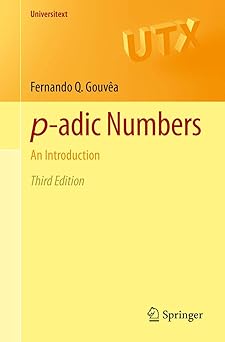
- Author: Fernando Gouvea
- Edition: 3rd
- Series: Universitext
- Publisher: Springer
- Publication Date: 06/20/2020
- Number of Pages: 379
- Format: Paperback
- Price: $34.99
- ISBN: 978-3-030-47294-8
- Category: textbook
[Reviewed by Allen Stenger, on 04/18/2021]
This book is a gentle introduction to the theory of p-adic numbers that focuses on their construction, and their arithmetic and analytic properties, but has only a little bit on their uses. It is aimed at undergraduates, and intends to enrich the usual standardized undergraduate curriculum with a visit to one of the “more exotic corners of mathematics”. The book assumes some knowledge of number theory and abstract algebra, as well as portions of analysis (specifically the construction of a completion of a metric space).
This new edition, issued 25 years after the previous one, is not drastically different, and polishes rather than revises the earlier edition. The new edition includes usage of the free Sage and GP software packages, with a brief appendix explaining them and examples throughout the book. There is a new section of miscellaneous harder problems at the end of the book, titled “Fun With Your New Head” (perhaps a nod to science-fiction writer Thomas M. Disch).
The development is leisurely and straightforward. The first three chapters deal with some background and motivation, and then the construction of the p-adic numbers Qp . The next chapter deals with analysis in Qp (mostly power series). The next chapter considers the problems of algebraic closure and of field extensions, and constructs the p-adic complex numbers Cp. The final chapter sketches how analysis works in Cp . The last two chapters are a good bit more difficult than the previous ones.
The book concentrates on developing the p-adic numbers themselves rather than on doing anything with them. There is one section (§4.8) of applications to Diophantine equations, that makes use of Hensel’s Lemma and the Hasse (local-global) Principle.
The book is loaded with exercises (not very difficult ones), that appear in-line in the text exactly when you should be working on them, rather than collected at the end of sections or chapters. There are hints or answers for all exercises (except the New Head ones) in the back of the book. The book concludes with a very useful “Brief Glance at the Literature”, that gives one or two paragraph synopses of other books in this field, including competing (introductory) books, more advanced books, and more specialized books that concentrate on number theory or on analysis.
Allen Stenger is a math hobbyist and retired software developer. He is an editor of the Missouri Journal of Mathematical Sciences. His personal website is allenstenger.com. His mathematical interests are number theory and classical analysis.